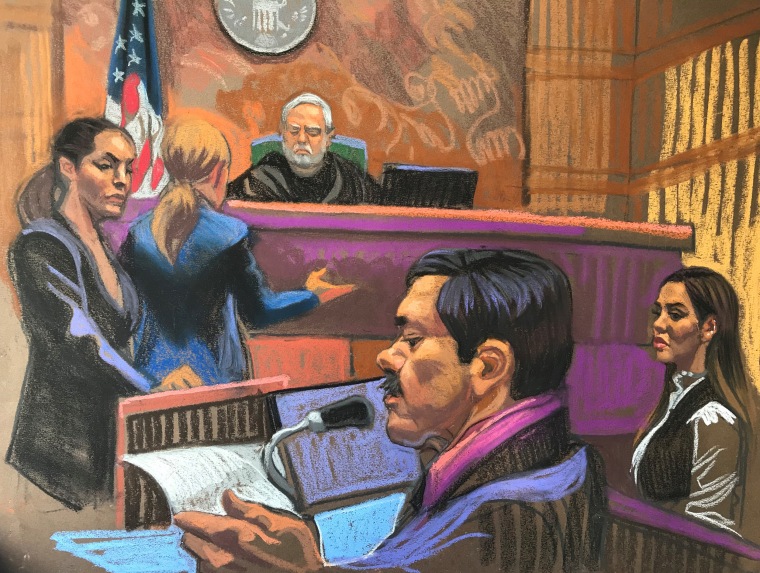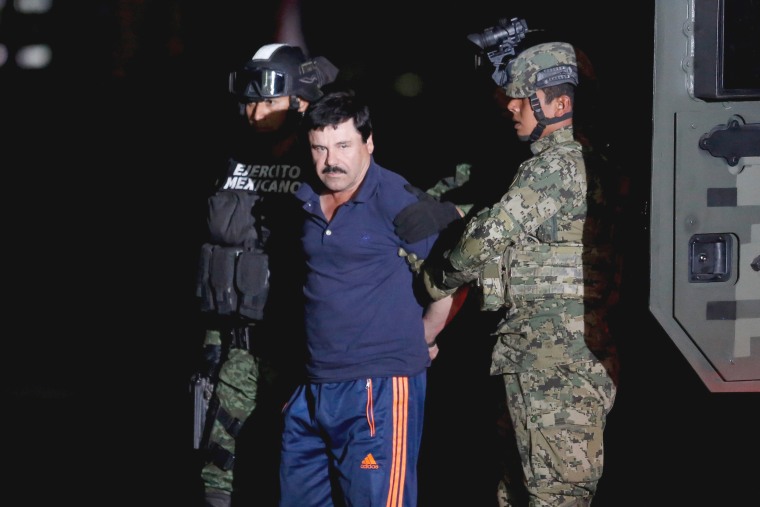Joaquín Guzmán Loera, the crime kingpin known as "El Chapo" who controlled much of the illegal drug trade across the Western Hemisphere for almost three decades, was sentenced in a federal courtroom in New York on Wednesday to life in prison plus 30 years.
Before he was sentenced, Guzmán, 62, told a federal judge that his case was "stained" by juror misconduct. He said the judge denied him a fair trial on drug trafficking charges "when the whole world was watching."
Guzmán — whose nickname refers to his height; it roughly translates as "Shorty" — was responsible for shipping more than 200 tons of cocaine to the United States alone as head of Mexico's Sinaloa cartel, as well as brutal murders and widespread political payoffs, prosecutors said during his three-month trial in U.S. District Court in Brooklyn, where he was convicted in February.
The drug lord, who escaped twice from prisons in Mexico before being recaptured in 2016 and brought to the United States, has been held in solitary confinement in an ultra-secure unit at a Manhattan jail, and his attorneys requested Wednesday that he remain there for 60 more days. Government officials said they had no issue with the request.
He will likely end up at the federal government's Supermax prison in Florence, Colorado, known as the "Alcatraz of the Rockies," experts have said. Most inmates there are given a television, but their only window to the outside is 4 inches, and they hardly ever interact with other people, as they eat all meals in their cells.
"When I was extradited to the United States, I expected to have a fair trial, but what happened was exactly the opposite," Guzmán said in court through an interpreter on Wednesday.
He said his human rights had been disrespected while in jail. Through tears, he said the last 30 months had been torture — saying he doesn't sleep well, has trouble breathing, doesn't get to see sunlight and hasn't been able to see his wife or hug his daughters.
He also thanked his family, his legal team, prison guards and supporters for prayers.
Guzmán first escaped from prison in Mexico in 2011 after bribing guards and purportedly being smuggled out in a laundry cart. Mexican authorities recaptured him in 2014 and, at the time, denied a U.S. request for his extradition, declaring it a matter of national sovereignty.
He then escaped a second time in 2015 through a mile-long tunnel underneath his maximum-security prison cell. Guzmán ran free for almost six months before he was recaptured in January 2016. This time, after a year of negotiations, Mexico agreed when U.S. officials again sought his extradition.

After his conviction in the United States, a life sentence was mandatory under federal sentencing guidelines, but the Justice Department asked Judge Brian Cogan to tack on an extra 30 years because Guzmán illegally used firearms in the commission of his larger crimes.
Cogan said Wednesday that Guzmán's "overwhelming evil is so severe."
Guzmán's attorney, Jeffrey Lichtman, said that because Cogan was required to hand down a life sentence, the additional request further proved that the proceedings against his client were what he called a "show trial."
Guzmán was dressed in a suit for the hearing, and as he entered the courtroom, he shook hands with his attorneys and blew kisses to his wife, Emma Coronel Aispuro, in the gallery. She often attended her husband's proceedings, even when testimony portrayed her in a bad light.
The U.S. and Mexican governments portrayed Guzmán's arrest and conviction as victories against the deadliest criminal organization in the Western Hemisphere. But analysts say the Sinaloa cartel has continued to hum along in its reign of terror from its base in Culiacán in the Mexican state of Sinaloa.
"Without El Chapo, the Sinaloa Cartel has hardly faltered despite the arrest of some of the group's top leaders and some other important members," InSight Crime, a nonprofit investigative group funded by governments and universities, said in an analysis in October.
"The Sinaloa Cartel has a horizontal structure with decision-making authority spread throughout the organization, as opposed to a vertical structure with just one or a few key members calling the shots," according to InSight. So when Guzmán was decommissioned, Ismael Zambada García, 71, known as "El Mayo," was able to step in with the aid of two of Guzmán's sons.
Zambada has kept things running smoothly while Guzmán was in custody, "maintained the cartel's structure and continues to do so today in the drug lord's absence," InSight said.

Indeed, in 2013 — citing evidence going back as far as 2002 — a U.S. Drug Enforcement Administration organizational chart of the Sinaloa cartel's leadership positioned Zambada alongside Guzmán as joint leader of the cartel.
Zambada is wanted by the United States on charges of murder committed in furtherance of a drug conspiracy, conspiracy to commit murder in a foreign country, racketeering, drug trafficking, money laundering, illegal use of firearms and kidnapping.

